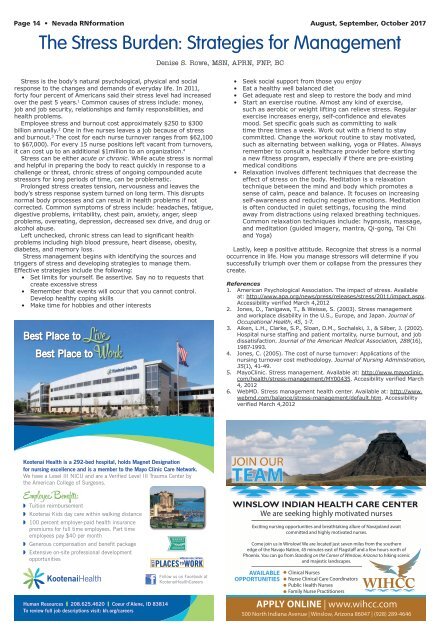Nevada RNFormation – August 2017
Create successful ePaper yourself
Turn your PDF publications into a flip-book with our unique Google optimized e-Paper software.
Page 14 • <strong>Nevada</strong> RNformation <strong>August</strong>, September, October <strong>2017</strong><br />
The Stress Burden: Strategies for Management<br />
Denise S. Rowe, MSN, APRN, FNP, BC<br />
Stress is the body’s natural psychological, physical and social<br />
response to the changes and demands of everyday life. In 2011,<br />
forty four percent of Americans said their stress level had increased<br />
over the past 5 years. 1 Common causes of stress include: money,<br />
job and job security, relationships and family responsibilities, and<br />
health problems.<br />
Employee stress and burnout cost approximately $250 to $300<br />
billion annually. 2 One in five nurses leaves a job because of stress<br />
and burnout. 3 The cost for each nurse turnover ranges from $62,100<br />
to $67,000). For every 15 nurse positions left vacant from turnovers,<br />
it can cost up to an additional $1million to an organization. 4<br />
Stress can be either acute or chronic. While acute stress is normal<br />
and helpful in preparing the body to react quickly in response to a<br />
challenge or threat, chronic stress of ongoing compounded acute<br />
stressors for long periods of time, can be problematic.<br />
Prolonged stress creates tension, nervousness and leaves the<br />
body’s stress response system turned on long term. This disrupts<br />
normal body processes and can result in health problems if not<br />
corrected. Common symptoms of stress include: headaches, fatigue,<br />
digestive problems, irritability, chest pain, anxiety, anger, sleep<br />
problems, overeating, depression, decreased sex drive, and drug or<br />
alcohol abuse.<br />
Left unchecked, chronic stress can lead to significant health<br />
problems including high blood pressure, heart disease, obesity,<br />
diabetes, and memory loss.<br />
Stress management begins with identifying the sources and<br />
triggers of stress and developing strategies to manage them.<br />
Effective strategies include the following:<br />
• Set limits for yourself. Be assertive. Say no to requests that<br />
create excessive stress<br />
• Remember that events will occur that you cannot control.<br />
Develop healthy coping skills<br />
• Make time for hobbies and other interests<br />
• Seek social support from those you enjoy<br />
• Eat a healthy well balanced diet<br />
• Get adequate rest and sleep to restore the body and mind<br />
• Start an exercise routine. Almost any kind of exercise,<br />
such as aerobic or weight lifting can relieve stress. Regular<br />
exercise increases energy, self-confidence and elevates<br />
mood. Set specific goals such as committing to walk<br />
time three times a week. Work out with a friend to stay<br />
committed. Change the workout routine to stay motivated,<br />
such as alternating between walking, yoga or Pilates. Always<br />
remember to consult a healthcare provider before starting<br />
a new fitness program, especially if there are pre-existing<br />
medical conditions<br />
• Relaxation involves different techniques that decrease the<br />
effect of stress on the body. Meditation is a relaxation<br />
technique between the mind and body which promotes a<br />
sense of calm, peace and balance. It focuses on increasing<br />
self-awareness and reducing negative emotions. Meditation<br />
is often conducted in quiet settings, focusing the mind<br />
away from distractions using relaxed breathing techniques.<br />
Common relaxation techniques include: hypnosis, massage,<br />
and meditation (guided imagery, mantra, Qi-gong, Tai Chi<br />
and Yoga)<br />
Lastly, keep a positive attitude. Recognize that stress is a normal<br />
occurrence in life. How you manage stressors will determine if you<br />
successfully triumph over them or collapse from the pressures they<br />
create.<br />
References<br />
1. American Psychological Association. The impact of stress. Available<br />
at: http://www.apa.org/news/press/releases/stress/2011/impact.aspx.<br />
Accessibility verified March 4,2012<br />
2. Jones, D., Tanigawa, T., & Weisse, S. (2003). Stress management<br />
and workplace disability in the U.S., Europe, and Japan. Journal of<br />
Occupational Health, 45, 1-7.<br />
3. Aiken, L.H., Clarke, S.P., Sloan, D.M., Sochalski, J., & Silber, J. (2002).<br />
Hospital nurse staffing and patient mortality, nurse burnout, and job<br />
dissatisfaction. Journal of the American Medical Association, 288(16),<br />
1987-1993.<br />
4. Jones, C. (2005). The cost of nurse turnover: Applications of the<br />
nursing turnover cost methodology. Journal of Nursing Administration,<br />
35(1), 41-49.<br />
5. MayoClinic. Stress management. Available at: http://www.mayoclinic.<br />
com/health/stress-management/MY00435. Accesibility verified March<br />
4, 2012<br />
6. WebMD. Stress management health center. Available at: http://www.<br />
webmd.com/balance/stress-management/default.htm. Accessibility<br />
verified March 4,2012

















